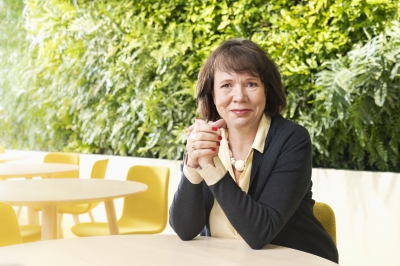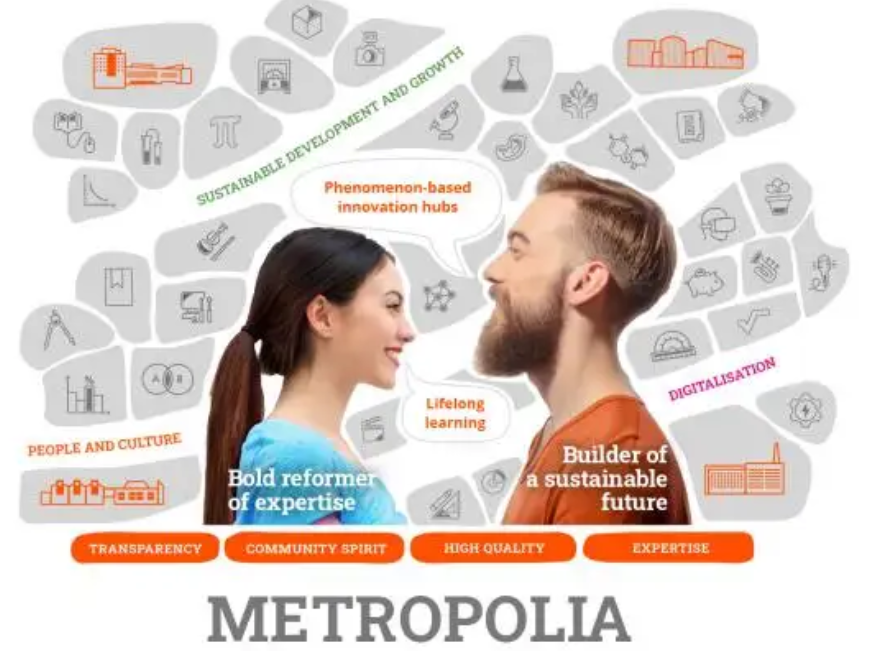President and CEO's review 2020: Learning together at the core during exceptional year
 In 2020 we focused heavily on renewal, aiming at greater social impact. We focused on the development and implementation of degree studies and other learning solutions, impactful innovation hubs, promotion of business, skilled and motivated personnel and clear enterprise resource planning. We set our sights on future potential by publishing our new strategy for 2021–2030.
In 2020 we focused heavily on renewal, aiming at greater social impact. We focused on the development and implementation of degree studies and other learning solutions, impactful innovation hubs, promotion of business, skilled and motivated personnel and clear enterprise resource planning. We set our sights on future potential by publishing our new strategy for 2021–2030.
The coronavirus pandemic had a major effect on our operations in 2020. Our campuses were closed from March until the end of the spring term, and in the autumn we started the next academic year with a hybrid model.
During the year we took major strides in time- and location-independent ways of working, virtual community activities and interaction over the network. We succeeded extremely well in transferring from contact to remote teaching.
Despite the challenging year, we performed much better than expected.
Our new strategy aims for an even better impact for the benefit of society
In the autumn, Metropolia published its new strategy for 2021–2030, aiming for even greater impact for the benefit for society, people first. The five themes of the strategy are lifelong learning, phenomenon-based innovation hubs, sustainable development and growth, people and culture and digitalisation.
Metropolia highlighted sustainable development and growth as a theme that runs through all aspects of its strategy for 2021–2030. The goal is that sustainable development and responsibility will guide all of Metropolia's operations and that Metropolia will be carbon-neutral by 2030. As our frame of reference, we are using the UN Sustainable Development Goals on which we will base our sustainable development roadmap in the spring of 2021.
Metropolia's sustainable development programme includes not only our ecological, social and financial sustainability but also an effectiveness aspect, that is, ensuring that we have the know-how for the future needs of sustainable development and solutions for global challenges. Sustainable development solutions are created in Metropolia's innovation hubs in cooperation with partners. Sustainable development will be present in all of Metropolia's education.
Eduix, Headai and Metropolia have jointly developed the Agenda2030 analysis tool that can be used to compare training offered by Metropolia to the UN Sustainable Development Goals. Utilising a data model developed by technology company Headai, it is the first tool of its kind in the world.
Individual lifelong learning services for a variety of needs
At Metropolia, lifelong learning includes learning aiming at a degree and other learning solutions. In 2020, lifelong learning focused on the development of individual learning solutions and services, the creation and utilisation of multiform teaching methods and learning environments, student-oriented counselling, and the development of teaching and learning quality.
Degree programme education
In the joint application in spring 2020, Metropolia was the most popular university of applied sciences in Finland, with 11,101 applicants putting Metropolia as their first choice. Measured in terms of eligible first-choice applications per number of intakes, Metropolia was Finland's fifth most attractive university of applied sciences. When compared to other universities of applied sciences and universities, Metropolia was in tenth place.
A new record of Master's degrees – 485 – was made at Metropolia in 2020. Bachelor's degrees numbered 2,680, or 114 less than a year ago. This decline can be attributed to the coronavirus pandemic. Metropolia graduates have a higher-than-average rate of employment compared to their peers.
Other learning solutions
Flexible learning solutions were promoted in 2020 by investing in pedagogical development and the development of the Metropolia Match service concept. Metropolia Match offers flexible learning solutions for people with various life situations. The concept was developed in 2020 by implementing a variety of flexible path studies from secondary education to higher education and by creating a learner-driven total guidance model.
Teachers in charge of pedagogical and quality development began their work in the autumn. Pedagogical development plans were drawn up for all competence units, and their implementation was started. To meet demand caused by the coronavirus pandemic, Digital Clinic services were set up to support the teaching staff in the implementation of online learning offering in remote education and the autumn's hybrid learning solutions.
SIMHE (Supporting Immigrants in Higher Education in Finland) services were continued throughout the year. In autumn 2020, a centre of expertise was set up in cooperation with the cities of Helsinki, Espoo and Vantaa, with the purpose of providing services to highly educated immigrants in early 2021.
The number of credit points within open UAS, courses offered jointly by higher education institutions and in preparatory courses and in specialisation studies (64,738) increased by 71 per cent from the previous year. This steep increase can be explained by, for example, a higher number of courses available online and students' better online learning skills.
Solutions and multidisciplinary cooperation for the best of all society
Metropolia's five phenomenon-based innovation hubs enable a novel way of learning, creating solutions and working in multidisciplinary ways for the best of all society.
In 2020, the innovation hubs focused on the improvement of learning and cooperation opportunities, operational effectiveness and visibility, strategic partnerships, campus platforms and RDI and entrepreneurship services.
Helsinki XR Center's annual Match XR event was organised in the VR Pavilion Finland virtual environment, with more than 900 participants from around the world.
Early in the year, the Myllypuro campus started the HyMy-Village (Wellbeing from Myllypuro) project, a people-centred and multidisciplinary learning and development environment enabling students to have genuine customer encounters. In the autumn, Myllypuro also started Metropolia Proof Health, which offers companies and research partners a modern environment and extensive expertise in preclinical development work.
Metropolia's open RDI activities and learning was given a boost when Metropolia signed the Declaration for open science and research along with other Finnish higher education institutions and research communities. The declaration creates a common ground for promoting openness and increasing the accessibility, impact and significance of research findings.
Metropolia's RDI turnover was EUR 19.0 million, up by 42.5 per cent on the previous year (EUR 13.3 million). External RDI funding stood at EUR 6.8 million.
Financial statements 2020: Performance significantly better than expected
- Turnover totalled EUR 103.1 million, a growth of 4.9% on the previous year.
- Operating expenses amounted to EUR 98.1 million, an increase of 0.8% on the previous year.
- Personnel expenses totalled EUR 64.0 million, representing 62.1% of turnover.
- Depreciation and amortisation amounted to EUR 7.7 million.
- The result for the financial year was a profit of EUR 5.1 million. Profit for the year increased by EUR 3.4 million on the previous year.
- At the close of the year, Metropolia’s overall financial situation was good.
Despite the coronavirus pandemic, Metropolia's 2020 performance was significantly better than expected. Metropolia's result for the 2020 financial year was a profit of EUR 5.1 million, an increase of EUR 3.4 million on the previous year. This improvement was made possible by a higher turnover, more streamlined operations, lower expenses for premises thanks to the new campuses, and lower operating expenses because of the coronavirus pandemic.
At the end of 2020, Metropolia’s overall financial situation was good. Profitability improved on the previous year, liquidity and solvency remained good and the equity ratio was 73.4%.
Events after the close of the period
The Soiva house, new music campus in Arabia, was handed over to its users on 11 February 2021, with operational use to begin in March or April 2021.
Metropolia will continue to have in place the measures that proved effective in keeping the coronavirus pandemic in check. Metropolia applies the hybrid model and adjusts its coronavirus recommendations regularly as the situation develops.
The City of Helsinki has set up a coronavirus vaccination station at Metropolia's Myllypuro Campus.
Importance of cooperation highlighted
The exceptional situation brought about by the coronavirus pandemic created added difficulty to what was already a hectic pace in working life in 2020. As people started working remotely, the challenges and stress factors related to work and coping with daily life became even more acute. At Metropolia, key elements in supporting staff wellbeing consisted of maintaining a sense of community and trust, and taking people's feelings into account.
During the year, a key aspect of personnel management consisted of responding to needs arising from the exceptional situations and arrangements necessitated by the coronavirus pandemic.
Personnel development focused on supporting remote learning and working and digital pedagogical skills. Metropolia's digital mentors supported the implementation of high-quality remote education, with the Digital Clinic sharing good practices.
Despite all its challenges, 2020 will be remembered above all as a year of solutions. Even under unanticipated conditions, it was cooperation, openness and the courage to try something new that proved to be the winning formula. I want to thank all our stakeholders and our higher education community for their flexibility and cooperation.
Riitta Konkola,
President and CEO
